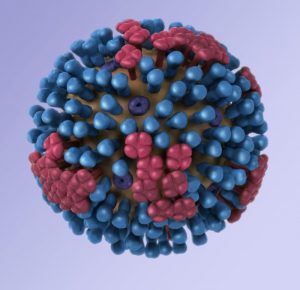Tackling Root Causes: Screening and Addressing Non-Medical Drivers of Health


A global leader in influenza prevention, Seqirus presented today absolute efficacy data on the company’s cell-based quadrivalent influenza vaccine (QIVc) from a randomized controlled trial (RCT) which met its primary endpoint in children and adolescents between ≥2 to <18 years of age over three influenza seasons.

This study represents the first absolute efficacy study of a cell-based seasonal influenza vaccine in this population.
“Annual influenza vaccination is extremely important,” said Jonathan Edelman, MD, Vice President, Clinical Development at Seqirus and study author. “This study reinforces our commitment to addressing this very serious public health threat by utilizing our advanced influenza vaccine technologies to help protect as many people as possible, including populations such as children between the ages of 2 and 18.”
Standard influenza vaccines are manufactured using the egg-based manufacturing process and may be subjected to egg-adapted changes. QIVc is developed using the cell-based influenza vaccine manufacturing process, an alternative to egg-based manufacturing.
“We are pleased to continue to build a strong body of evidence for QIVc across expanded populations,” said Gregg Sylvester, MD, Chief Medical Officer at Seqirus. “Amidst the ongoing COVID-19 pandemic, we are more grounded than ever in our mission to safeguard against seasonal influenza. With over 100 million doses of QIVc distributed globally as of September 2020, we are proud to share this data highlighting the benefit of our cell-based influenza vaccine technology for young children.”
In the U.S., Seqirus operates a state-of-the-art cell-based manufacturing facility located in Holly Springs, North Carolina, purpose-built in partnership with the Biomedical Advanced Research and Development Authority (BARDA) to increase cell-based vaccine manufacturing capacity and combat pandemic influenza threats. Cell-based influenza vaccine technology may potentially offer advantages over the standard influenza manufacturing process, including being more scalable and offering faster production in the event of an influenza pandemic.
QIVc is marketed in the United States as FLUCELVAX® QUADRIVALENT, and currently licensed for use in people 4 years of age and older. In the United Kingdom and European Union, QIVc is marketed as FLUCELVAX® TETRA▼and is currently licensed for use in people 9 years of age and older. The results of this study will be used to support applications to national regulatory bodies such as the U.S. Food and Drug Administration (FDA) and the European Medicines Agency (EMA) for an expanded age indication in children ≥2 years of age.
Seqirus plans to continue exploring other clinical research associated with FLUCELVAX QIVc. According to the World Health Organization (WHO), the most effective way to prevent influenza is by receiving a seasonal influenza vaccine. In particular, children younger than 5 years of age can be at a high risk of developing serious complications from influenza. Since 2010, estimated annual influenza-related hospitalizations among children younger than 5 years of age have ranged from 7,000-26,000 in the U.S. Since the 2004/05 influenza season, annual influenza-related deaths in children younger than 5 years of age range from 37-188 in the U.S.
Comments
Post a Comment